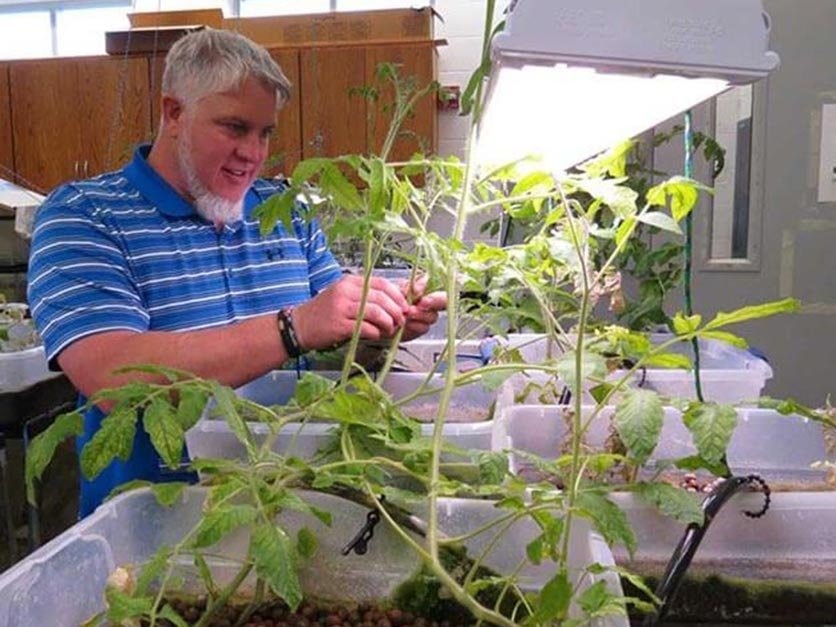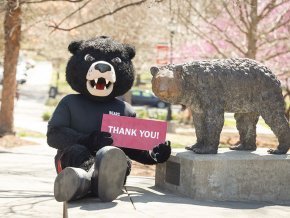Professor and alumnus seek to combat food deserts

The U.S. Department of Agriculture defines food deserts as areas where people cannot access affordable and nutritious foods. They are usually found in impoverished areas lacking grocery stores, farmers markets and h
Agriculture business is North Carolina's largest industry, but, ironically, for a state that produces crops such as sweet potatoes, and livestock like —hogs, cattle and poultry—the Tarheel state has its share of food deserts.
The U.S. Department of Agriculture defines food deserts as areas where people cannot access affordable and nutritious foods. They are usually found in impoverished areas lacking grocery stores, farmers markets and healthy food providers. Food deserts contribute to food insecurity, which means people aren't sure where their food will come from.
To address some of these concerns, LR alumnus Nate Bickford '97 and Dr. Craig Schreiber, associate professor of management, are working with Jo Nelson, director of Total Action for Progress, a nonprofit agency in Roanoke, Virginia, and Sonja Bickford, assistant professor of communication at University of Nebraska at Kearney, to implement funding they received from the U.S. Department of State. They are exploring ways to help provide residents with access to fresh, healthy food.
The first grant focuses on decreasing food deserts. Nate Bickford is working with Schreiber to develop workshops on urban hydroponic farming, combining biology and business competencies for successful implementation within at-risk communities. As part of the second grant, the team will modernize management competencies, also developing workshops aimed at increasing soft skills and sustainability practices of managers specifically to nonprofit organizations. After their yearlong research is completed in April 2020, they will offer workshops in Hickory, North Carolina; Pueblo, Colorado; and Roanoke, Virginia.
"The focus of this project is to teach people to grow their own food in places where it may be difficult to grow, such as inner cities or places that don't have a lot of green space," Bickford said. "This [hydroponic farming] is a very modern energy efficient, water efficient and economically efficient method for growing a lot of food."
Bickford, who teaches at Colorado State University Pueblo, has experimented in his lab to design systems that are more efficient. "I'm looking at ways that we can teach people to grow their food so we can eliminate some of the food insecurities across the U.S.," he said.
In Nelson's Roanoke community, the team will offer workshops in a specific neighborhood where there are no grocery stores left. One component is to implement a place to grow the food. A second component, led by Schreiber, is to give the residents the financial skills and business skills to make the location sustainable and effective.
"We want to help them make this a side business or full business," Schreiber said. "We provide them with the knowledge and understanding of how to operate and take the next step to be an entrepreneur."
Another dimension of the business side allows Nelson to specifically consider the diversity in these communities to allow for successful implementation of the programs. From the silent generation to Gen Z, there are five generations in the workplace so the team is challenged to use some of the funding to address soft skills, such as leadership, motivation and communication, to effectively engage employees or community members. The TAP agency is an anti-poverty community action agency, which helps individuals and families achieve economic and personal independence through education, employment, affordable housing, and safe and healthy environments.
"We want our last component to give skills to manager to effectively engage the whole workforce," Nelson said. "Through this particular workshop, we intend to share content with higher education, nonprofits and various business industries to show the value of this working and the transferability of skills."
Long-term, the team said the results in three communities will build validity and usability for future expansion.
"We have built a very collaborative, different group," Bickford said. "Our grant represents natural sciences, business, nonprofit and academia and is a great example of a transdisciplinary education model."

Thank you to the 1,469 donors who made Bears Give Back 2025 a success, raising $695,472 to support Lenoir-Rhyne University programs and students. Your generosity strengthens our community and fuels our future.
View More
Fulbright Scholar Thinh Truong ’17, M.S., has built his family and career by embracing adventure. His journey proves success is about the experiences that shape us.
View More